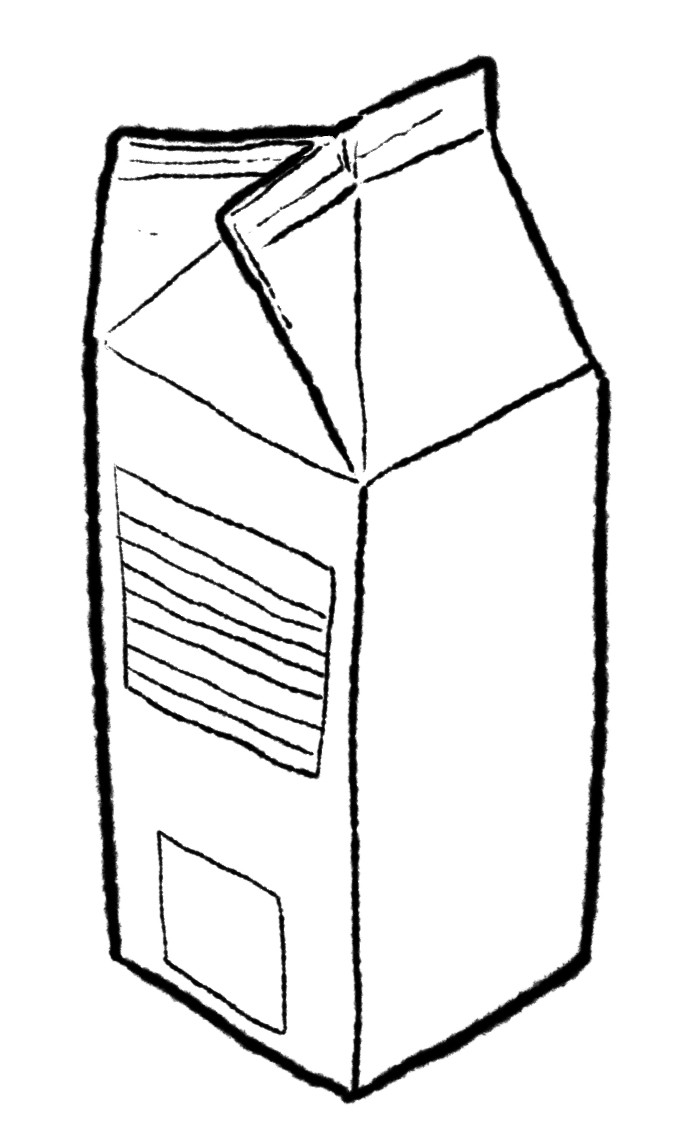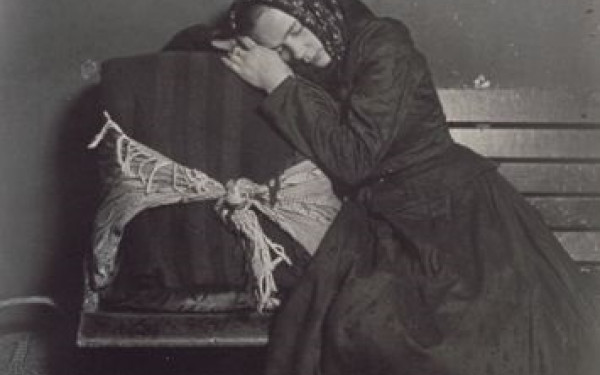The milk’s gone sour
*Trigger warning at bottom of story.
I was writing a paper on Virginia Woolf when my telephone rang. It hung in the air like a noose.
It was an undergraduate essay on Woolf’s “The Cinema,” and I was examining “life as it is when we have no part in it,” but really, I hadn’t a clue. The TV was playing in the room over, and I could hear it through the thin membrane separating my bedroom from the living room, where my roommate sat watching Bugs Bunny on a small relic of a television. We had picked up some secondhand electric box on the curb a few weeks prior, and I now felt the soundwaves moving through my room, shuffling my papers. I wondered how the television was so loud—the wall strained to stifle the low-frequency hum. I heard the murmur of dialogue playing through the drywall, the bottom half of all that was being said.
That day and the television now feel like an undercurrent: muffled, rushing. The centre of that day concentrates, the borders blur. I picture myself swimming to shore, getting closer, a hand pinching my toe and dragging me back out. The scene fades to black.
I reached for my phone, but hesitated before picking it up. I couldn’t think of anyone I wanted to talk to and decided not to answer. A dog was barking outside. It was winter, and a particularly cold day; I wore two sweaters. I looked around my room and closed my laptop, shut the window, cracked my knuckles, and tried to figure how long I had been at this essay. The television carried through. I thought of a motel room I once stayed in with my family—a night rolling around in brittle sheets, everyone around me fast asleep, the sounds of late-night cable porn playing through the walls: muffled, croaking.
I left my unfinished paper and passed through the living room on my way to the kitchen. My roommate, David, sat on the couch eating a bowl of cereal without any milk. I stood in the door frame between the kitchen and the living room and felt the floors shaking beneath the weight of him, watched him keeled over laughing and slapping his knee. The floors dipped towards him; he had left a depression in the wood through his permanence. My entrance went unnoticed.
I finally made my way towards the fridge and found that it had been left open. David’s eyes were fastened on the screen. I heard my phone go off in my room again. It sounded like my alarm clock.
“Are you going to get that?” “You left the fridge open,” I said.
“I don’t know why you won’t just answer it, or why you hit snooze on your alarm a dozen times every morning.”
I looked at him through the door frame. I looked back into the kitchen.
“I don’t know why you can’t close the fridge or the cupboards or the toilet seat.”
He cupped the bowl in his palm and spooned the rest of the dry cereal into his mouth. I glanced over at the screen and watched Elmer Fudd aim his rifle at Bugs Bunny and fire off a shot. The rifle exploded in his hands, creating a dark cloud that filled the screen. When the shroud of smoke subsided, his face was covered with a thick layer of smut. A carrot had been lodged in the gun’s barrel.
“Didn’t use the fridge today,” David said, “must have been you.” I wondered why I had moved in with a stranger in the city I grew up in. There were so many other Davids in Montreal.
I let it go and further opened the already breached fridge. It emitted warm yellow light onto the black and white linoleum floors, sang a faint music, a loud hum. A sour stench spilled from the door left ajar. I pinched my nose with one hand and rummaged through the shelves with the other, tossing aside the wilting herbs and the thawed package of two-day-old pork. My hand hovered over the carton of milk. The cow’s face, printed on the carton, looked me in the eyes. Beware, kid, the milk’s gone sour. I suddenly lost my appetite.
The telephone rang.
I left the kitchen behind and the milk in the fridge. I got to my room and sat in my chair, listening to Bugs Bunny finish his line before I answered. Two rings after the first. I answered on the fourth. My roommate laughed in the other room when the man’s voice told me that my brother had killed himself. I think that’s what made me most sad. Bugs Bunny was fleeing from Elmer Fudd, my roommate was laughing, the milk was sour, the fridge was humming, my brother, Alexander, was dead. I hadn’t seen him in three years, and so maybe it was my fault.
Alex and I didn’t speak often, though I always thought that this was on account of our saving all the newfound stories for the next round of beers. That image lingered in my head: walking into a tavern, my eyes adjusting from the bright lights outside, focusing on the outline of a body leaning over the bar, an apparition waiting for me on that lonesome stool. I thought the world was cruel for separating us over time. My roommate laughed. He was right.
When they told me what my brother had done, I had a vision of a flock of seagulls circling overhead, a choir of these feathered saints singing on a beach. Then, somewhere else, I imagined a baby being born into the same song of that circulating air. The way that clouds travel over provinces, so too did this song. The infant cried its own chords, its fleshy bottom spanked bare as the eager eyes and grinning lips waited for their turn to hold it in their arms, circled around, releasing their own gasps of admirations, swallowing the songs of birds and newborn life. I should have called him more. He never got on well with our mom or dad. Maybe things might have taken a different course if I had made myself more available to him.
Life as it is.
The voice trickled from the receiver as it went on talking. I wanted to hear the television in the next room but what I heard was the dripping voice and the clock ticking next to me. I put the phone down without hanging up. The voice continued buzzing on my desk. Somewhere in the world, a man didn’t know what my face looked like. He picked up a phone to tell me that somewhere else in the world, my brother wouldn’t call.
I walked into the living room after hanging up the phone. I didn’t know what to do with my hands. My roommate was sitting where I last saw him, staring at Elmer Fudd, who was still in pursuit of Bugs Bunny. I sat next to him on the couch and thought it was going to swallow me whole. Odd, the things we remember. Then, everything is sharp: The walls looked like they had a fresh coat of lime green paint. The TV looked smaller. I had breached the waves, crowned from beneath the dragging white waters, could hear the seagulls circling above. I felt the seaweed loosen its grip. I realized it was time to buy a new couch.
“Who was it?”
“My brother.”
“How’s he doing?”
“He’s alright I guess, just sold one of his paintings.”
“He still living out West?”
“Still living.” I gazed into the shrunken TV screen, sinking further into the couch.
Bugs Bunny tied a stuffed rabbit to the fin of a shark, successfully tricking Fudd into chasing it into the ocean. Fudd hopped into his boat and chased “Bugs Bunny” into the horizon. Shortly into his pursuit, the shark turned and surfaced from below, exposing alabaster arrowhead teeth, swallowing Fudd’s boat in a single gulp. Fudd remained suspended in the air. My roommate laughed. Fudd ran to shore for rescue, his legs serving as rotary propellers keeping him above surface, but was kidnapped by pirates along the way. They sailed into a speck on the horizon and Bugs Bunny got away.
The iris wipe.
It was snowing outside, and I was sad that Bugs Bunny got away. A man with a gun always gets the hare. I wanted the kids to know.
I got up to go to the kitchen and opened the cupboard. I found an empty box of cereal. I went to the fridge and picked up the carton of milk to give it a smell. It wasn’t that bad, so I poured myself a bowl without any cereal and drank it.
When I was a child, my mother forced me to drink a glass of curdled milk. She thought I was making excuses to avoid drinking it and told me that I wouldn’t be excused from the table until I finished it. I drank the first half and became nauseous. When she turned away, my brother took the opportunity to drink the rest. He looked at me and winked, as if to say, thanks for the spoiled milk, kid. It made sense for me to now do the same.
After I had finished the bowl of spoiled milk, I left the carton on the counter and went back to my room. I sat down where I had gotten the call. The phone was still where I left it, and I waited.
But it didn’t ring. It sat there, as did I, day after day, until somebody called to ask if I had life insurance. It was spring, my roommate had left for Toronto, there were bowls stacked in piles around my room. The snow melted to reveal the ground beneath, and somewhere a dead rabbit thawed from under its rigor mortis—its coat of grey fur gone, the carcass slowly disintegrated by the enveloping forest, its bones a championed medallion around Death’s collar. And all the while, as life unfolded around me, I remained seated, unsure of what to do with my hands.
I picked up the phone and dialed my brother’s number. A strange man’s voice rose on the other end.
- Trigger warning: suicide
Curtis McRae’s fiction has appeared in Soliloquies Anthology, the QWF Chronicling the Days series, and will be forthcoming in an anthology published by Guernica Editions. He is the co-founder and creative director of yolk literary journal. Curtis has worked covering events for Blue Metropolis, and was a finalist in the 2019 QWF contest for emerging young writers. He has received a fellowship from Concordia University and will begin work on his MA in creative writing in the fall of 2020.
This article originally appeared in The Disorientation Issue, published September 8, 2020.






